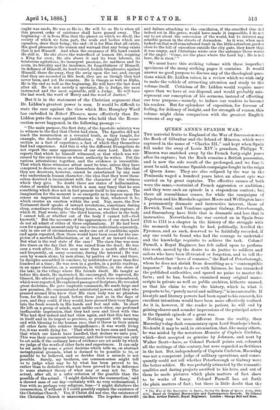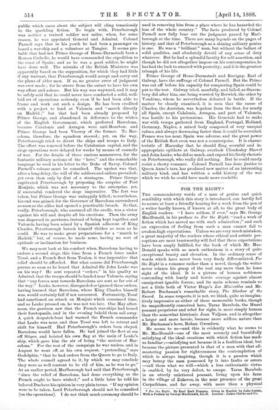QUEEN ANNE'S SPANISH WAR
THE material fruits to England of the War of Succession were the Rock of Gibraltar and the Island of Minorca, which were
captured in the name of " Charles and kept when Spain fell under the sway of Louis ICIV.'s grandson, Philippe V. Minorca was snatched away by the French forty-eight years after its capture ; but the Rock remains a British possession, and is now the sole result of the prolonged, and we fear it must be said, wearisome Spanish campaigns fought in the reign of Queen Anne. They are also eclipsed by the war in the Peninsula waged a hundred years later, an almost epic war carried on by great captains. The effective causes of both were the same,—restraint of French aggression or ambition ; and they were each an episode in a stupendous contest; but there all resemblance ceases, for while the campaigns of Napoleon and his Marshals against Moore and Wellington have a permanently dramatic and instructive interest, those of Berwick, Tesse, and Vendome against Galway, Peterborough, and Staremberg have little that is dramatic and less that is instructive. Nevertheless, the war carried on in Spain from 1705 to 1711 is a chapter in the history of the struggle with the monarch who thought he had, politically, levelled the Pyrenees, and as such, deserved to be faithfully recorded, if any one could be found who had the courage to undertake and the knowledge requisite to achieve the task. Colonel Parnell, a Royal Engineer, has felt called upon to perform this work, moved by the desire to do justice to soldiers and sailors who have been ill-treated or forgotten, and to tell the truth about that "hero of romance," the Earl of Peterborough, whom he does not shrink from describing as a " contemptible impostor." In order to do so with fairness, he has ransacked the published authorities, and spared no pains to master the facts ; and he has, besides, examined many original manu- scripts in private as well as public archives, hitherto unused, so that his claim to write the history, which is, what it purports to be, "purely naval and military," is incontestable. If his style and literary powers had been equal to his research, his excellent intentions would have been more effectively realised. As it is, however, if the reader is patient, he will end by gaining clearer and sounder impressions of the principal actors in the Spanish episode of a great war.
Nothing can be more different from the reality, than Macaulay's slap-dash commentary upon Lord Stanhope's book. No doubt it may be said, in extenuation, that, like many others, he was misled by the notorious Memoirs of Captain Carleton, which—first accepted as genuine by Johnson, and next by Walter Scott—have, as Colonel Parnell points out, coloured all the writings of this century, but were regarded as fictitious in the last. But, independently of Captain Carleton, Macaulay was not a competent judge of military operations, and conse- quently could not tell whether Peterborough or Galway were the better soldier. He was probably attracted by the romantic qualities and daring projects ascribed to his hero, and out of them he made pictures which plain matters of fact show to be works of fancy. Colonel Parnell has set forth the plain matters of fact ; but there is little doubt that the
• The War of the Succession in Spain, during the Reign of Queen Anne, 1702- 1711. Based on Original Manuscripts and. Contemporary Records. By Colonel
the Hon. Arthur Parnell, Bois' Engineers. London George Bell and Bons.
public which cares about the subject will cling tenaciously to the sparkling fiction. To begin with, Peterborough was neither a trained soldier nor sailor, when, for some reason, he was appointed General and Admiral. Colonel Parnell says that in his youth he had been a passenger on board a war-ship and a volunteer at Tangier. It seems pro- bable that had not Prince George of Hesse-Darmstadt been a Roman Catholic, he would have commanded the expedition to the coast of Spain ; and as he was a good soldier, he might have done well. The mistake of the British Ministers was apparently based on the supposition, for which they had little if any warrant, that Peterborough would accept and carry out the plans of abler men. If so, no greater error of judgment was ever made ; for he strove from the outset to have his own way afloat and ashore. But his way was wayward, and it may be safely said that he could never have conducted a solid, well- laid set of operations seriously, even if he had been able to frame and work out such a design. He has been credited with a project to land at Valencia and "march directly on Madrid ;" but that had been already proposed by Prince George, and abandoned in deference to the wishes of the English Government, which preferred Barcelona, because Catalonia and Arragon were anti-Bourbon, and Prince George had been Viceroy of the former. To Bar- celona, therefore, the squadron steered ; yet, on the way, Peterborough tried to divert the ships and troops to Italy. The effort was renewed before the Catalonian capital, and the siege operations were delayed for weeks by means of councils of war. For the details of these curious naanceuvres, for the fantastic military notions of the " hero," and the remarkable language he used in his letter to the Duke of Savoy, Colonel Parnell's volume must be consulted. The upshot was that, after a long delay, the will of the soldiers and sailors prevailed ; yet even then only by dint of a stratagem. Prince George captivated Peterborough by proposing the surprise of Fort Monjuic, which was not necessary to the enterprise, yet, if successful, rendered the siege imperative. The fort was taken, but Prince George was unhappily killed ; nevertheless, his end was gained, for the Governor of Barcelona surrendered as soon as the allies had opened a practicable breach. So that, really, Peterborough, who assumed all the credit, was a victor against his will and despite all his exertions. Then the army was dispersed in garrisons, instead of being kept together, and Valencia having been seized by a Spanish adherent of King Charles, Peterborough betook himself thither as soon as he could. He was to make great preparations for a "march to Madrid," but, of course, he made none, having no sort of aptitude or inclination for business.
We may next look at his conduct when, Barcelona having to endure a second siege, this time from a French force under Tease, and a French fleet from Toulon, it was imperative that relief should be afforded. But what course did Peterborough pursue so soon as he heard that Admiral Sir John Leake was on his way P He sent repeated " orders," in his quality as Admiral, that the troops should be landed near Valencia, saying that any forces sent towards Barcelona are sent so far out of the way." Leake, however, disregarded or ignored these orders, having learned that Barcelona, where King Charles himself was, would certainly fall if not succoured. Fortunately, Tesse had sanctioned an attack on Monjuic which consumed time, and as Leake pressed on, he was not too late. One May after- noon, the garrison saw that the French war-ships had loosed their foretopsails, and in the evening beheld them sail away. A quick despatch-boat had warned the French commander that Leake was near, and thus Tease was left to retreat and shift for himself. Had Peterborough's orders been obeyed, Barcelona would have fallen. He had joined the fleet at sea off Sitges, and hoisted his own flag at the main of Leake's ship, which gave him the air of being "the saviour of Bar- celona." For the rest of the campaign he was useless, and in August he went off, at his own request, " pretending," says Godolphin, " that he had orders from the Queen to go to Italy. The whole council agreed to it, by which we may conclude they were as well content to be rid of him, as he was to go." At an earlier period, Marlborough had said that Peterborough " since the relief of Barcelona, had done everything as the French ought to have wished;" and a little later he told his beloved Duchess his opinion in very plain terms. "If my opinion were to be taken, Lord Peterborough should not be consulted Eon the operations]. I do not think much ceremony should be used in removing him from a place where he has hazarded the loss of the whole county." The facts produced by Colonel Parnell now fully bear out the judgment passed by Marl- borough at the time. There are many legends on the pages of history, and that of Peterborough as a shining military genius is one. He was a " brilliant " man, but without the ballast of solid qualities, and absolutely devoid of any sense of duty whatever. But he had a splendid faculty for self-assertion, and though he did not altogether impose on his contemporaries, he has had the luck to succeed with posterity; and it is the greatest triumph of his life.
Prince George of Hesse-Darmstadt and Ruvigny, Earl of Galway, have the suffrage of Colonel Parnell. But the Prince was cut off before his capacity for conquering Spain could be put to the test. Galway tried, manfully, and failed, as Starem- berg did after him, one being worsted by Berwick, the other by Vendome, whom he nevertheless defeated in battle. If the matter be closely examined, it is seen that the cause of Charles, the Austrian, was hopeless from the first, for nearly all Spain, except Calalonia, Arragon, and part of Valencia, was hostile to his pretensions. His Generals had to make war with troops gathered from England, Portugal, Holland, Germany, Naples, a mixed body composed of very unequal values, and always decreasing faster than it could be recruited. France was too near, Spain was adverse, and the great power of the British fleet even was not a counterpoise. It is charac- teristic of Macaulay that he should fling scornful and in- appropriate epithets at Galway, overlook Cloudesley Shovel and John Leake, who did so much, and expend his lively rhetoric on Peterborough, who really did nothing. But he could rarely resist a showy romance. Colonel Parnell has done justice to Queen Anne's tars, has produced new matter of an interesting military kind, and has written a solid history of the war which we wish he could have made more readable.



































 Previous page
Previous page